Syracuse U Pro-BDS Faculty Issue Call to ‘Resist’ Events Co-hosted with Israeli Institutions
Because It’s ‘Normalization’ – proving BDS is against peace and willing to destroy academic freedom.
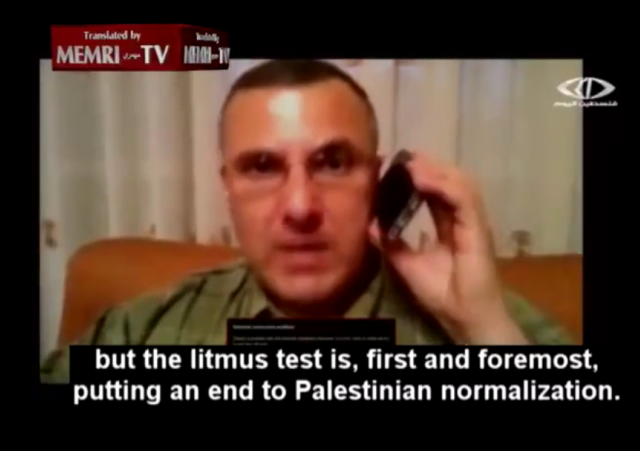
Last month, Syracuse University (SU) made headlines when a faculty member in the Religious Studies Department dis-invited an award-winning Israeli NYU Professor and filmmaker from a campus event out of fear of offending the political sensibilities of her BDS-supporting colleagues (see our prior posts covering the story).
At the time, pro-BDS faculty signed a petition (subsequently posted onto Facebook) denying that any pressure to disinvite the filmmaker had existed and expressing their commitment to free speech and academic freedom.
But now many of these same professors, keen on moving the campus in a BDS direction, are making demands that call into question this articulated devotion to a campus community open to free expression.
Last Friday (September 23), a group of BDS-supporting faculty—primarily Humanities professors, but including some who work in the ‘soft’ Social Sciences—joined with some of their students to publish a letter in the Daily Orange, the campus student-run newspaper, calling for the boycott of SU events jointly run with Israeli academic institutions.
The 35 signatories also condemned an international conference which was being held on campus that day on account of its being co-hosted by SU’s program on conflict resolution and a Tel Aviv University peace studies center. The reason for the condemnation was that the conference failed to comply with BDS guidelines about boycott, non-interaction, and anti-normalization with Israeli institutions and scholars.
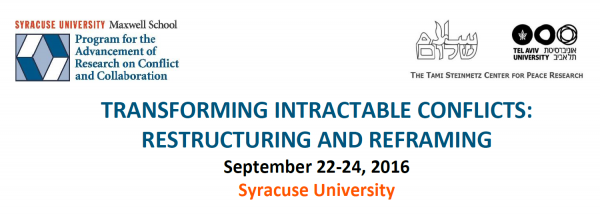
Below I provide the text of the letter, the response letter that was published in yesterday’s Daily Orange, and the lessons that can be learned from this incident.
#BDS profs demand: events @SyracuseU must comply w/guidelines for non-interaction w/Israeli academics. Not kidding. @SUPoliSci @SUMaxwell https://t.co/rjuS5hnzAN
— Miriam F. Elman (@MiriamElman) October 2, 2016
Pro-BDS Letter Published in the Daily Orange
In their September 23 letter, 35 students and faculty: (1) endorsed the goals of the Boycott, Divestment and Sanctions (BDS) movement which promotes an academic boycott against Israel as a key part of its agenda; (2) condemned an international conference then underway at the Maxwell School’s Program for the Advancement of Research on Conflict and Collaboration (PARCC) because of its “misguided framework” for the study of intractable conflicts and on account of its being co-hosted with The Tami Steinmetz Center for Peace Research at The Tel Aviv University in Israel; and (3) urged SU students and faculty to boycott all such future academic events because they would violate the guidelines for non-interaction with Israeli academic institutions, researchers and students put forth by the Palestinian Campaign for the Academic and Cultural Boycott of Israel (PACBI).
The move garnered praise by anti-Israel BDS supporters beyond the Syracuse campus:
Commendable effort by Syracuse University activists to respect the call for BDS and end collaboration with… https://t.co/vQOK4hLWm7
— Miko Peled (@mikopeled) September 23, 2016
As we’ve argued in prior posts (for example, see here), BDS supporters aren’t only interested in boycotts and divestment—they’re also against “normalization” and coexistence efforts. They want to make sure that Israelis don’t ever interact or engage with Palestinians—and that American faculty and students also refrain from these efforts.
Basically, the BDS-supporting signatories of last week’s letter are seeking to prevent all academic dialogue between SU and Israeli academia because these joint programs are unaligned with BDS goals and its agenda.
#BDS faculty at SU reject dialogue w/Israeli academics. Because 'normalization'. Unbelievable. @drdivine @EVKontorovich @ZacharyBraiterm https://t.co/rjuS5hnzAN
— Miriam F. Elman (@MiriamElman) October 2, 2016
Here’s a copy of the September 23 letter:
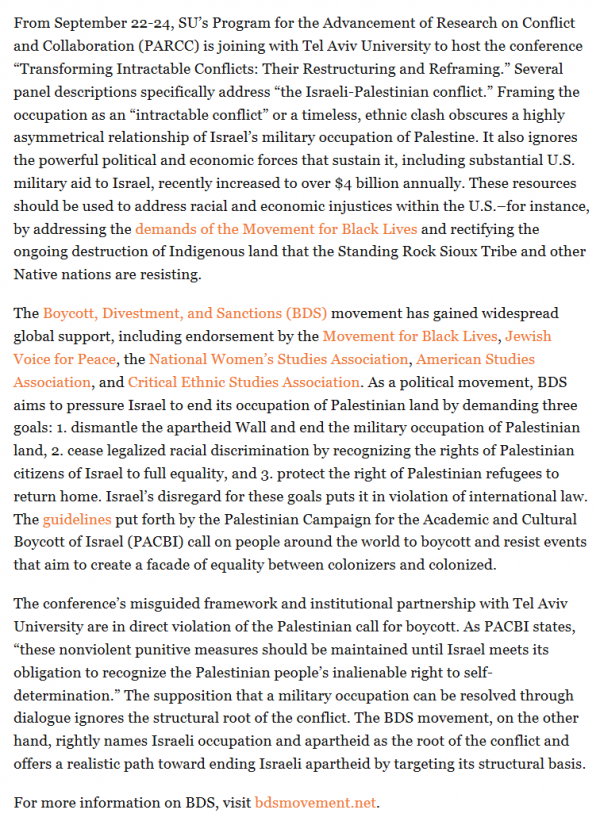
The International Conference “Transforming Intractable Conflicts”
The PARCC-TAU conference was over a year in the making.
As its co-organizer and co-convener, I worked closely with three other PARCC colleagues (all of whom signed the response letter below). We conceptualized the conference’s core themes and framework, developed the itinerary, and engaged with colleagues at the Tami Steinmetz Center for some months to facilitate the smooth arrival of 10 scholars from various Israeli institutions of higher learning.
I got to know these scholars pretty well, along with their work.
So here’s the irony: just like the episode involving the dis-invitation of the Israeli filmmaker last month highlighted that even famous anti-occupation, progressive Israelis aren’t immune from BDS bullying, here too SU’s BDS-supporting professors ended up shunning prominent members of the Israeli left-of-center.
The list of participants included well-known peace activists who work to oppose—in their research, teaching, and political advocacy—Israel’s occupation of Palestinian territories. Leading Israeli leftists like Daniel Bar-Tal and Galia Golan.
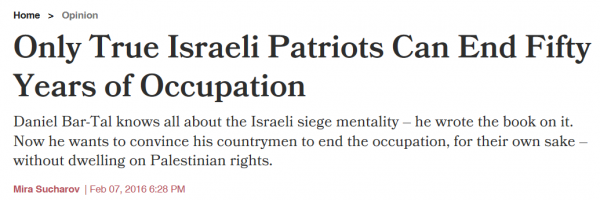
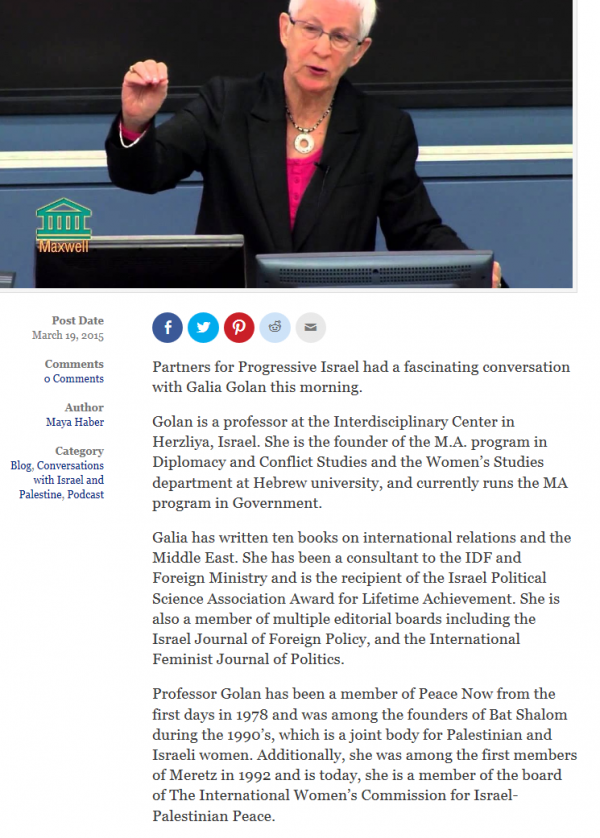
That these academics, who devote extraordinary amounts of their time and energy to challenge and change Israeli state policy, would be considered deeply complicit in Israel’s alleged violations of international law and human rights and therefore legitimate targets for boycott, shows just how insane the BDS movement really is.
Here’s some original photos from the event:
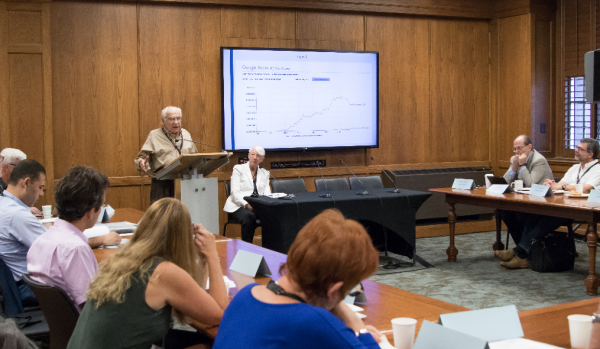
Opening Session
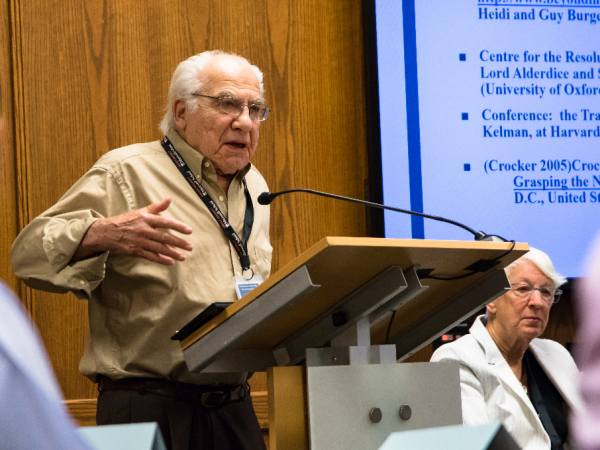
Louis Kriesberg | Opening Session
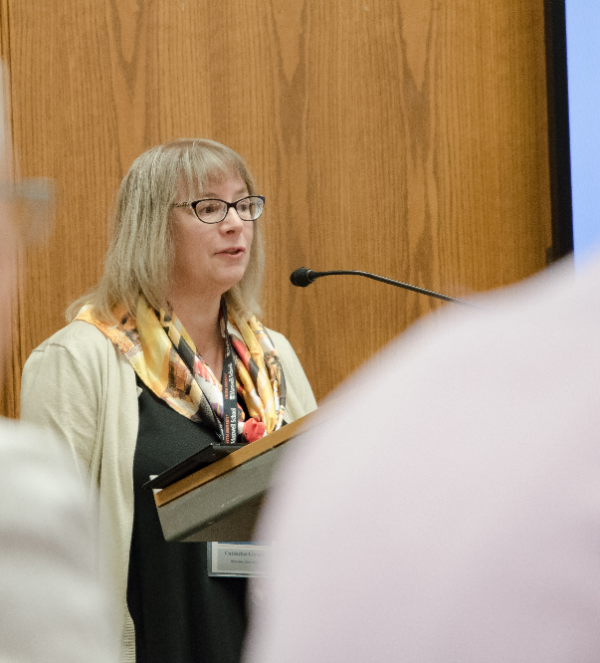
Catherine Gerard | PARCC Director | Opening Session
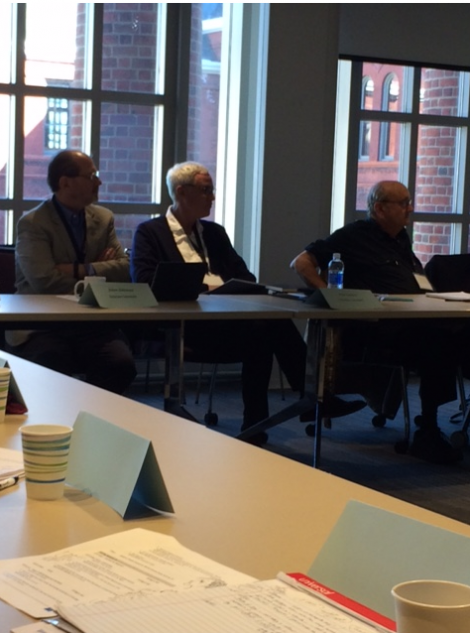
Robert Rubinstein, Peter Coleman, Amatzia Baram
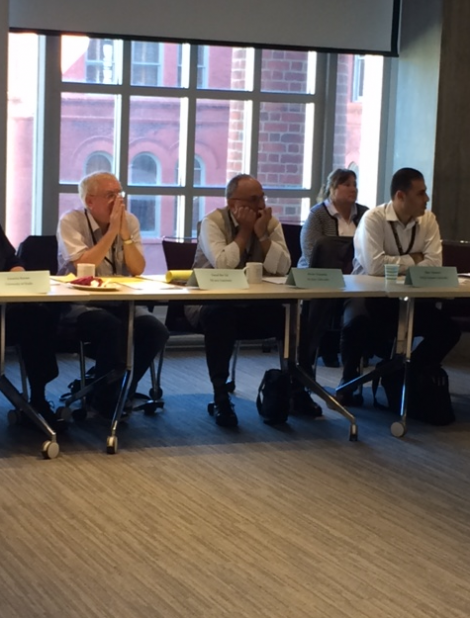
Daniel Bar-Tal, Mottie Tamarkin, Hani Albasoos
Push-Back: SU Conference Participants Publish Letter in the Daily Orange
I was so busy with the conference that I didn’t know that a pro-BDS letter was in the works, or that it appeared in the school newspaper—until the day after it was published.
The first opportunity I had to confer with my colleagues about whether to mount a response came after the conference had ended. There was a general consensus that a rejoinder was needed, but widely divergent views on what should be included in the reply.
Most of those I talked with were in agreement that our BDS-supporting faculty had every right to criticize and protest our conference—and even to encourage students to give it a miss—and that we needed to say that. There was a deep appreciation that the September 23 letter was itself an exercise of free speech. A number of interlocutors brought up the point that at no time were the proceedings disrupted by pro-BDS faculty or students.
We did agree that the letter constituted an effort to foreclose opportunities for us and our students to engage with scholars from different parts of the world, and as such should be strongly condemned. But some wanted to leave open the option of academic boycotts being legitimate courses of action under certain, rare conditions; others stood firm that they were always destructive in matters involving intellectual debate.
In the end, we managed to write a draft that half of the 15 SU faculty who were among the conference participants agreed to sign.
The Daily Orange’s strict 400 word limit on letter submissions (the paper doesn’t accept op-eds) necessitated further deliberation and rounds of revision.
Below is the text of the letter that was accepted yesterday in the Daily Orange. Coming in at 398 words, it says what needed to be said.

The list of 8 signatories—including the current and two former directors of PARCC—are also included below.
We write to express our concern about a September 23 letter which we fear could call into question Syracuse University’s commitment to the open exchange of ideas.
We appreciate that our colleagues had the right to publicly condemn an international conference then underway at the Maxwell School’s Program for the Advancement of Research on Conflict and Collaboration (PARCC), but they fundamentally misunderstood the nature of the gathering. It was not devoted to the study of Israel or to the Israeli-Palestinian conflict. Rather, participants sought to analyze a range of factors (including political, economic, psychological, gendered, legal, historical, military/security, religious, media- and identity-driven forces) that sustain deep-seated inter-personal, local, national, and international conflicts.
The 31 conference participants from Syracuse, Israel, Oman, Turkey, and across the U.S.—many leaders in the field of conflict resolution—presented on a diverse array of conflicts, from the Haudenosaunee (Iroquois) effort to decolonize sacred space in central NY to conflict transformation in Northern Ireland and trauma in Syracuse communities of color. We regret that the signatories to the September 23 letter chose not to attend and would have warmly welcomed their participation.
BDS continues to face sustained opposition as reflected in the statements of over 250 university administrators including recently by SU’s Vice Chancellor Michele Wheatly. The American Association of University Professors, Association of American Universities, National Association of Scholars and others have also determined that academic boycotts subvert and undermine the fundamental value of free inquiry and as such are not an appropriate means of advancing ideas within the academy.
We recommend that SU students learn about the BDS perspective. However, we oppose efforts to present BDS as an uncontested, single truth about Israel, the Israeli-Palestinian conflict, America’s role in the world, or even America itself. On each of these topics, a rich and multidisciplinary scholarship offers alternative modes of representation. Our position is not that these arguments are necessarily more persuasive than those which BDS offers, but that using instruments of coercion to advance only one particular point of view and seeking to predetermine the outcome of what should be an open debate is a debasement of the academic enterprise.
Syracuse University has long partnered with universities outside the U.S. to provide educational opportunities for ourselves and our students. We look forward to continuing in that tradition by hosting scholars and students from the global community, including Israel, at future campus events”.
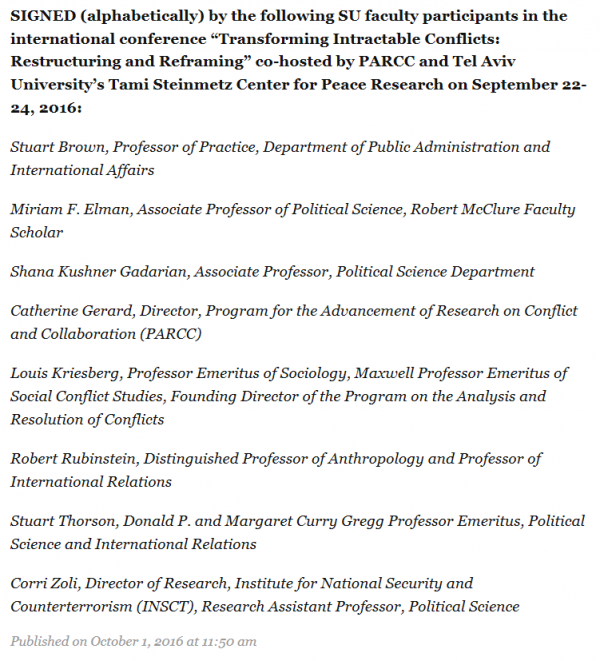
Conclusions: BDS is a Threat to Academic Freedom
There are three take-aways from this incident.
First, it underscores just how far pro-BDS faculty are willing to go to in order to engage in a type of morality play, where Israel shifts into a uniquely evil and demonic category vis-à-vis the absolute goodness of the Palestinians. These days, abrogating liberal ideals and the bedrock principles of the academy, including free speech and open intellectual inquiry, apparently isn’t too high a price to pay for the opportunity to signal one’s own virtue.
Second, the collective action problems we faced in fielding a timely and effective response to the September 23 letter are pervasive hurdles that the anti-BDS community will need to overcome in order to have more successful challenges to BDS in the future. The BDS movement has little problem working up documents on the fly and getting large numbers of people to sign just about anything quickly. Meanwhile, on the anti-BDS side, everything is pored over and nitpicked. People agonize over signing—for days. Even after insisting that revisions be made, they wind up dropping out and refuse to put their name on it.
Lastly, as I argued in a prior op-ed, this incident highlights that successfully confronting boycotters ultimately depends on whether individual faculty are willing and able to take a stand. Anti-BDS groups and organizations can’t take the place of faculty who need to put aside their research and other work-related commitments for a period of time in order to take on the challenges of ‘campus politics’.
As with much committee work, in the end my colleagues and I were able to submit a credible response to the September 23 pro-BDS letter because a small group of us agreed to take the reins, and were prepared to devote the time and effort needed to get the job done.
@SyracuseU Kudos @MiriamElman and colleagues for exposing once again #BDS manipulative falsifications
— Gilead Sher (@GileadSher) October 2, 2016
[Featured Image: Omar Barghouti, co-founder of BDS movement]
Miriam F. Elman is an associate professor of political science at the Maxwell School of Citizenship & Public Affairs, Syracuse University where she was recently appointed the Robert McClure Faculty Scholar for her commitment to citizenship and undergraduate education. She is the editor of five books and the author of over 60 journal articles, book chapters, and government reports on topics related to international and national security, religion and politics in the Middle East, the Israeli-Palestinian conflict. She also frequently speaks and writes on the Boycott, Divestment, and Sanctions (BDS) anti-Israel movement. Follow her on Twitter @MiriamElman
 DONATE
DONATE
Donations tax deductible
to the full extent allowed by law.








Comments
BDS seeks to DEMONIZE the conflict.
So anything that NORMALIZES the conflict…that is rationalizes it…is to be crushed.
They can’t stand the open debate in the public square.
As Israel moves from strength to strength, BDS is a dying cause, although understandably that may not be obvious to those immediately harassed. BDS stepped up tactics are evidence of its desperation.
BDS is also founded on an assumption that while true, is less so than it used to be and is likely to become even less true in the future, especially as the gas fields open—that without Western support, Israel dies.
Lefty ethnocentric narcissism at its worst.
“The 31 conference participants from Syracuse, Israel, Oman, Turkey, and across the U.S.—many leaders in the field of conflict resolution—…”
Is this supposed to be a joke?